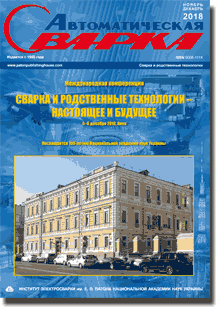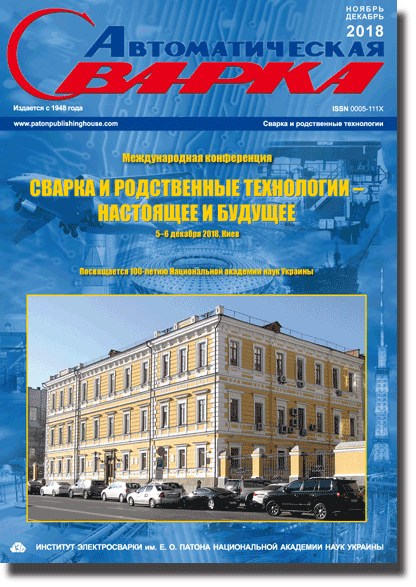| 2018 №12 (06) |
DOI of Article 10.15407/as2018.12.07 |
2018 №12 (08) |

Avtomaticheskaya Svarka (Automatic Welding), #11-12, 2018, с. 78-85
Diffusion welding and brazing of dissimilar materials with controlled stress-strain state
V.V. Kvasnitsky1, V.F. Kvasnitsky2, Chen Hexing3, M.V. Matvienko2, G.V. Ermolayev2
1NTTU «Igor Sikorskii Kiev Polytechnic Institute». 37 Pobedi, 03056, Kiev, Ukraine. E-mail: kvas69@ukr.net
2Adm. Makarov National Shipbuilding University 9 Heroev Ukraini Prosp., 54025, Nikolaev, Ukraine. E-mail: welding@nuos.edu.ua
3Guangdong Academy of Sciences. No.9, Building, 100 Xianlie Rd. Guangzhou, P. R. China. E-mail: chenhexing@gdas.gd.cn
Stress-strain state in vacuum diffusion welding and brazing of dissimilar materials was studied, allowing for plastic deformations of instantaneous plasticity and creep. The role of plastic deformations in joint formation and residual stresses in vacuum diffusion welding of dissimilar metals, in particular of metals with non-metals, as well as similar metals with interlayers is considered. Application of temperature loading simultaneously with external load at vacuum diffusion welding of dissimilar metals allows creating a bulk stressed state in the butt joint, with formation of axial, radial, circumferential, tangential stresses, promoting localization of plastic deformations in the butt joint zone and development of shear deformations, and intensification of the processes of formation of physical contact, activation of the surfaces and development of diffusion processes. Control of stress-strain state at joining of metals with non-metals allows regulation of relaxation processes at cooling and prevention of joint fracture. 12 Ref., 9 Fig.
Keywords: diffusion welding, brazing, stresses, strains, modeling, structure, mechanical properties, diffusion
Received: 30.03.2018
Published: 06.11.2018
References
1. Krivtsun, I.V., Kvasnytskyi, V.V., Maksymov, S.Yu., Ermolayev, H.V. (2017) Special methods of welding. Ed. by B.E. Paton. Mykolaiv, NUK [in Ukrainian].
2. Ermolayev, H.V., Kvasnytskyi, V.V., Kvasnytskyi,V.F. et al. (2015) Brazing of materials. Ed. by V.F.Khorunov et al. Mykolaiv, NUK [in Ukrainian].
3. Makhnenko, V.I., Kvasnitsky, V.F. (2009) Peculiarities of formation of stress-strain state in diffusion bonds between dissimilar materials. The Paton Welding J., 8, 7-11.
4. Kvasnytskyi, V.V., Ermolayev, H.V., Matvienko, M.V. (2017) Mechanics of joints in diffusion welding, brazing and spraying of dissimilar materials under elasticity conditions. Nikolaev, NUK [in Russian].
5. Kvasnitsky, V.V., Zolotoj, Yu.G., Labartkava, A.B. et al. (2008) Experimental investigation of deformation of welded assembly of bush-bush type from dissimilar materials: Transact. NUK, Mykolaiv, NUK, 4, 65-73 [in Russian].
6. Kazakov, N.F. (1976) Diffusion welding of materials. Moscow, Mashinostroenie [in Russian].
7. Lobanov, L.M., Ermolayev, H.V., Kvasnytskyi, V.V. et al. (2016) Stresses and strains in welding and brazing. Ed. by L.M. Lobanov. Mykolaiv, NUK [in Ukrainian].
8. Kvasnitsky, V.V., Kvasnitsky,V.F., Markashova, L.I., Matvienko, M.V. (2014) Effect of stress-strain state on structure and properties of joints in diffusion welding of dissimilar metals. The Paton Welding J., 8, 8-14. https://doi.org/10.15407/tpwj2014.08.01
9. Emelyanov, V.M., Kvasnytskyi, V.V., Ermolayev, H.V. et al. (2009) Optimization of structure of metal-graphite slide-bearings on the base of residual stresses analysis in brazed assemblies. Vestnik Khersonsk. NTU. Kherson, KhNTU, 3, 42-46 [in Russian].
10. Ermolaev, G.B., Martynenko, V.A., Olekseenko, S.V. et al. (2017) Effect of the rigid interlayer thickness on the stress-strain of metal-grafite assemblies under thermal loading. Strength of Materials, May, 49(3) 422-428. https://doi.org/10.1007/s11223-017-9882-4
11. Kopelman, L.A. (2010) Principles of theory of strength of welded structures. St.-Petersburg, Lan [in Russian].
12. Kvasnytskyi, V.V., Kvasnytskyi,V.F., Dong Chunlin, Matvienko, M.V. et al. (2018) Stressed state of welded and brazed assemblies from similar materials with a soft interlayer under axial loading. The Paton Welding J., 4, 6-10. https://doi.org/10.15407/tpwj2018.04.01
The cost of subscription/purchase order journals or individual articles
| Journal/Currency | Annual Set | 1 issue printed |
1 issue |
one article |
| TPWJ/USD | 384 $ | 32 $ | 26 $ | 13 $ |
| TPWJ/EUR | 348 € | 29 € | 24 € | 12 € |
| TPWJ/UAH | 7200 UAH | 600 UAH | 600 UAH | 280 UAH |
| AS/UAH | 1800 UAH | 300 UAH | 300 UAH | 150 UAH |
| AS/USD | 192 $ | 32 $ | 26 $ | 13 $ |
| AS/EUR | 180 € | 30 € | 25 € | 12 € |
| SEM/UAH | 1200 UAH | 300 UAH | 300 UAH | 150 UAH |
| SEM/USD | 128 $ | 32 $ | 26 $ | 13 $ |
| SEM/EUR | 120 € | 30 € | 25 € | 12 € |
| TDNK/UAH | 1200 UAH | 300 UAH | 300 UAH | 150 UAH |
| TDNK/USD | 128 $ | 32 $ | 26 $ | 13 $ |
| TDNK/EUR | 120 € | 30 € | 25 € | 15 € |
AS = «Automatic Welding» - 6 issues per year;
TPWJ = «PATON WELDING JOURNAL» - 12 issues per year;
SEM = «Electrometallurgy Today» - 4 issues per year;
TDNK = «Technical Diagnostics and Non-Destructive Testing» - 4 issues per year.




